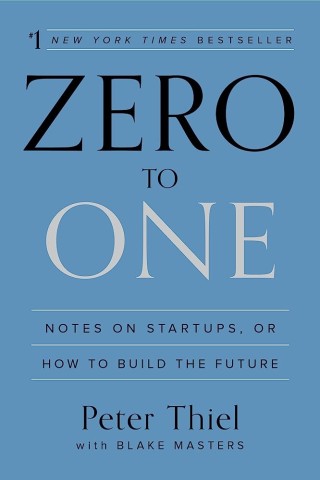Zero to One: Notes on Startups, or How to Build the Future (2014) by Peter Thiel (founder of PayPal and major startup funder thereafter) and Blake Masters (who took a course with Peter at Stanford, and using the extensive course notes produced the basis for this book). The crux of the book is vertical innovation - creating entirely new ideas, hence from 0 to 1 - as opposed to horizontal innovation - copying, expanding or tinkering with existing ideas, or going from 1 to many. For example... the first operating system, the first social network, the first mobile payment system. The book does not provide a pathway or blueprint, in fact opposes those. Instead, successful entrepreneurs used first principles instead of formulas. What are the traits of people who have made vertical innovations? Out of the box thinkers who are willing to take contrarian positions (question what we think we know) and not follow the crowd, and are fueled by courage (which they say is in even shorter supply than brilliance). The book is tech oriented and optimistic. Unique in many ways.
Some nuggets (not quotes):
Be bold. Have a mission. A bad plan is better than no plan. Macro narratives matter - (in)definite optimism, pessimism - for future visioning. The West is operating on an unsustainable and ineffective macro narrative - the unjust tyranny of chance using the analogy of evolutionary thinking to progress. It is not random or chance, plan. Incrementalism, risk aversion, complacency, a belief in flatness (global marketplace and resulting self doubt) oppose the motivation to do what has not yet been done.
Collaboration can be powerful. Competition is destructive. Monopoly is the aim, the profits of which create incumbent monopolies; competition is an ideology that assumes all actors are static and equal, but in reality actors are dynamic and unequal. Once you are 10x better, you eliminate competition and hold a monopoly. Focus on your 10x. Dominante a small market to start (Want to dominate the marketplace? Start with books, add gradually. Want to dominate the online trading marketplace? Start with niche products like beanie babies, expand gradually).
Higher education creates conformists. Schooling imparts conventional, generic wisdom; it does not teach where to look where others are not looking or see what others are not seeing. Think for yourself.
The secret to venture capital is that the best investment outperforms the entire portfolio - only invest in companies that have the potential for exponential growth at a vast scale (which can feel like gambling). The best ideas are the ones no one is looking at, not the theme of the day. A startup messed up at the foundation cannot be fixed. Founders relationships are as important as skills. The best product does not always win; products matter, so do sales.
Work relationships matter, the work culture needs to be more than transactional. You don't need skills, you need people who can work effectively together. Define roles, reduce conflict, hold people accountable. Talented people have a lot of choice, create an environment that attracts talent. Consultants have short-term commitment seeking immediate value, avoid unless specific (lawyers, accountants); employees need to share the vision and aspire to long-term change.

